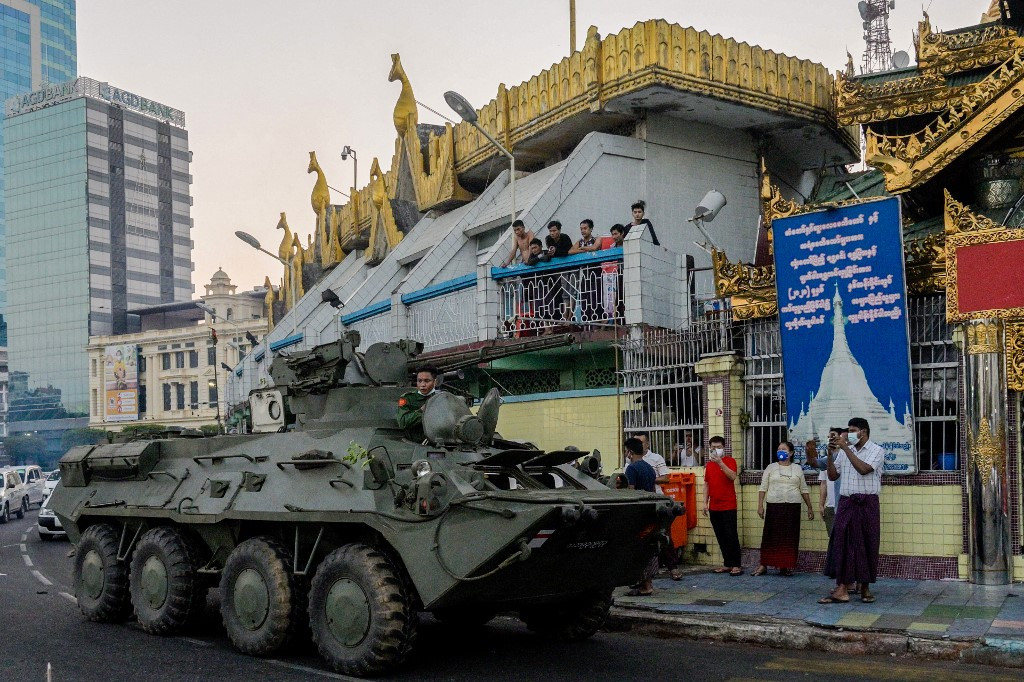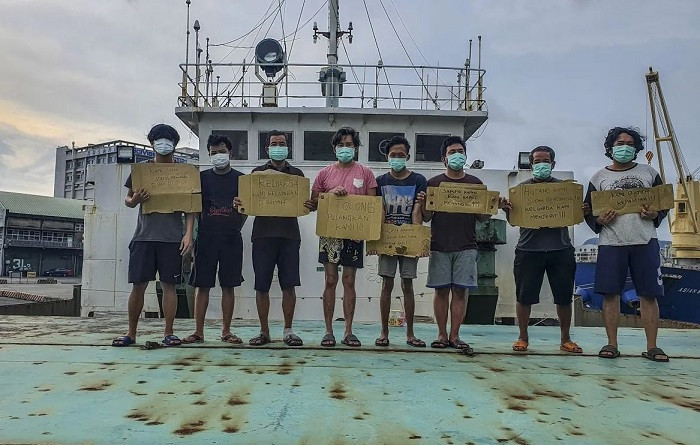Popular Reads
Top Results
Can't find what you're looking for?
View all search resultsPopular Reads
Top Results
Can't find what you're looking for?
View all search resultsASEAN: Supporting new Myanmar elections is not the solution
ASEAN appears to be undecided on its official response to the military coup in Myanmar, but the country's people have clearly demonstrated the course it must take.
Change text size
Gift Premium Articles
to Anyone
S
ince the demonstrations against the military coup in Myanmar started on Feb. 2, protestors have united across the country to express their rejection of the military regime. Protestors have congregated around the Sule Pagoda at the heart of Yangon, as well as outside the United States and Chinese embassies and other locations in the commercial capital.
But on Tuesday morning, they gathered outside the Indonesian Embassy in a leafy neighborhood just north of downtown Yangon. A sign placed outside the embassy compound made it clear why the protestors were there: "We don't need another election!! #Respect our votes," it read.
The protests were responding to a Reuters article published on Monday. It said Indonesia was planning to “push” members of the Association of Southeast Asian Nations (ASEAN) to agree on a response to the coup “that would keep the junta to its promise of holding elections” and handing power to the winner. The article, which cited “three sources familiar with the move”, led to an immediate backlash with Indonesia facing criticism for apparently siding with the Myanmar military.
A day later on Tuesday, Indonesia appeared to walk back its statement, with the foreign ministry reportedly telling Reuters that it was not seeking new elections in Myanmar. It was then reported that Indonesian Foreign Minister Retno Marsudi would fly to Myanmar on Thursday, but then on Wednesday, the planned trip was canceled.
As is so often the case with the opaque regional grouping, it’s hard to tell exactly how ASEAN is planning to respond to the coup. Statements have been issued, including by ASEAN chair Brunei Darussalam, as well as the representatives of Indonesia, Malaysia, Singapore and Thailand to the ASEAN Intergovernmental Commission on Human Rights. Some closed-door meetings have also taken place, but more than three weeks since the coup, it remains to be seen exactly what ASEAN's official response will be.
The Myanmar people deserve a response that goes beyond platitudes. ASEAN has leverage with the Myanmar military and must use it to ensure that the junta refrains from further violence, arbitrary arrests, internet shutdowns and other wide-ranging restrictions on freedom of expression and peaceful assembly.
This is the right thing to do and it is also in the bloc's best interests, not only from a regional security perspective, but also for its own reputation. As dozens of regional NGOs have noted in an open letter to the bloc, including the ASEAN Parliamentarians for Human Rights (APHR), failing to stand up and provide strong support for the Myanmar people “risks further damaging ASEAN’s reputation as an effective regional body that can meaningfully contribute to a strong and viable community of nations”.
ASEAN must also establish a response “that secures long-term democratic and human rights gains” in Myanmar, and this means absolutely rejecting the junta's calls for fresh elections. Since the Feb. 1 coup, the military junta has arrested more than 600 people, the majority from Aung San Suu Kyi’s National League for Democracy (NLD), while also adopting new and highly repressive laws to try and stifle the protest movement and criminalize any hint of criticism against it.
The junta has also formed a new Union Election Commission filled with figures pliant with their regime, stifled the internet on a daily basis and issued threats to the media.
It's abundantly clear that any election held under Myanmar’s military junta cannot be considered even remotely close to being free or fair.
Holding another election would also ignore the calls made by the hundreds of thousands of Myanmar people who have taken to streets in recent weeks, under threats to their lives, and demanded loud and clear that the results of the Nov. 8, 2020 election be respected.
Let's not lose sight of the fact that the military junta still has not provided any meaningful evidence of election fraud in last year's vote, which the NLD won resoundingly. (Claims made by the new military-pliant UEC in the state-run newspaper hardly provide that.) Meanwhile, international election observers such as The Carter Center have found that voters "were able to freely express their will at the polls and choose their elected representatives”.
One needs to go back only a decade to 2010 to see what a Myanmar election held by its military would look like. The conditions were so unfair that the NLD boycotted the election. In an election rife with accusations of voter fraud and without the NLD, the military-linked Union Solidarity and Development Party won a resounding victory. Although the quasi-civilian government that emerged initiated reforms away from decades of military rule, it was still not a government that was representative of the people's aspirations.
One also needs only to look among Myanmar’s neighbors to see how autocratic rulers can manipulate election processes to guarantee their victories. In Cambodia, Prime Minister Hun Sen’s Cambodian People's Party (CPP) won all National Assembly seats in 2018 after he used a trumped-up case to dissolve the main opposition party, the Cambodia National Rescue Party (CNRP), and jail or exile its leaders.
Myanmar's military, with its atrocious human rights record and autocratic nature, is trying to use similarly devious tactics under the facade of “fresh” elections to remove the political opposition and strengthen its hold on power.
Let’s be clear: The military junta did not mount a coup, imprison the country’s duly elected leaders and stifle civil freedoms just to hand over power a year later in free and fair elections.
ASEAN knows this, and must not play into their game. It must instead stand with the Myanmar people who have made it abundantly clear, both in the November 2020 elections and in the protest movement currently sweeping the country, that they reject military rule and demand democracy.
***
The writer is the APHR chair and a member of the Malaysian parliament.










